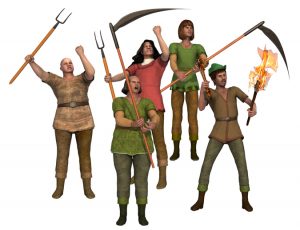 There’s a TED talk that I’ve heard about a few times in the last weeks. It’s by Nick Hanauer and called “Beware, fellow plutocrats, the pitchforks are coming.”
There’s a TED talk that I’ve heard about a few times in the last weeks. It’s by Nick Hanauer and called “Beware, fellow plutocrats, the pitchforks are coming.”
Hanauer’s life is enviable. He was an early Amazon investor and sold a company he started to Microsoft for $6.4 billion. He happily — perhaps gleefully — describes himself as a plutocrat.
Here is the key part:

8 Tips For Creating A Comprehensive ‘AI In The Workplace’ Policy
Corporate investment and usage in generative AI technologies continues to accelerate. This article offers eight specific tips to consider when creating an AI usage policy.
I have a message for my fellow plutocrats and zillionaires and for anyone who lives in a gated bubble world: Wake up. Wake up. It cannot last. Because if we do not do something to fix the glaring economic inequities in our society, the pitchforks will come for us, for no free and open society can long sustain this kind of rising economic inequality. It has never happened. There are no examples. You show me a highly unequal society, and I will show you a police state or an uprising.
Hanauer’s point is, basically, that very rich people should care about income inequality because otherwise everyone else will come after them with pitchforks, or we become a police state. It isn’t completely clear why Hanauer thinks plutocrats would mind a police state. If the rich are, as he says, hiding in their “gated communities and private schools” one would imagine it would be nice to have a lot of security outside helping them hide. But he seems to suggest a police state would be bad for him, and let’s just run with that.
So, assume that Hanauer is generally right that countries that have high levels of income inequality necessarily wind up with either a police state or mobs with pitchforks coming after the rich. And assume that the levels of income inequality we currently have in the United States are high enough that we’re at, or nearly at, police state or pitchfork levels.
If that’s right, does America go the way of the police state or the pitchfork?

How You Can Take Control Of Your Firm’s Financial Future
Roadblocks to data-driven business management are falling, and a better bottom line awaits.
There are a lot of reasons to think we become a police state. Indeed, one decent way to think of being a police state is that there are a lot of people locked up by the police. If that’s the right answer, then we’re there. We’re close to 1% of our population being in custody right now. It may be that we have the freedom to kneel during the Star Spangled Banner or post whatever we’d like on Facebook, but when 1% of your citizenry is sleeping in a cage, it does seem a little police stateish.
Mass incarceration, of course, affects the poor more than the rich. Though it isn’t as though the people in prison are there because they’ve scaled the barricades; mass incarceration largely stems from an effort to prosecute drug offenses more aggressively. One would think that if our criminal justice system is solely in service of the plutocrats it wouldn’t target a literal opiate of the masses for prosecution in those numbers.
That said, the apparatus is there. We have a lot of law enforcement in the United States — roughly .25% of the population is a cop of some kind. And that’s only folks carrying a gun and a badge — when you add in civilian law enforcement staff and corrections officers, you get a higher percentage nudging toward 1% of the population being in the business of putting another 1% of the country in prison.
Though America is a big and diverse country. You can see how the people doing God’s work in a public defender’s office could see the question differently than your average bond lawyer.
What about the pitchforks? There is reason to think that income inequality causes crime. At least for property crime this does seem to make sense; Jean Valjean wouldn’t have been a thief if he could have just bought the bread for his sister’s child. There’s reason to think that it isn’t income inequality itself, but conspicuous consumption, but let’s just slide past that distinction for present purposes. (If you’re curious, this piece in the Atlantic is fascinating)
In America, though, we never really talk about class without also talking about race. Recall Bernie Sanders’ joke: A banker, a blue collar worker, and an immigrant are sitting around a table. Someone drops $10 in the middle. The banker takes $9 then tells the blue collar guy to watch out — the immigrant is going to take his dollar. There’s reason to think this is close to what actually happens. Hate crimes, for example, tend to be more prevalent in places with higher levels of income inequality.
So maybe this is reason to think that the mob with pitchforks won’t come for the plutocrats.
I think, though, the most likely scenario for Hanauer is not that it’s a choice between a police state or a mob, but that the mob uses the police state to come after the very rich.
You saw some of this in the wake of the financial collapse in the cries for indictments in the C-suite of banks that were involved in bad lending practices. If rich folks made a buck, the thinking went, there must be a crime there somewhere.
The law is a human institution. The easiest release valve for pressure from income inequality may be to prosecute the wealthy. Maybe the mob comes not with pitchforks, but with subpoenas.
Matt Kaiser is a white-collar defense attorney at KaiserDillon. He’s represented stockbrokers, tax preparers, doctors, drug dealers, and political appointees in federal investigations and indicted cases. His twitter handle is @mattkaiser. His email is [email protected] He’d love to hear from you if you’re inclined to say something nice.